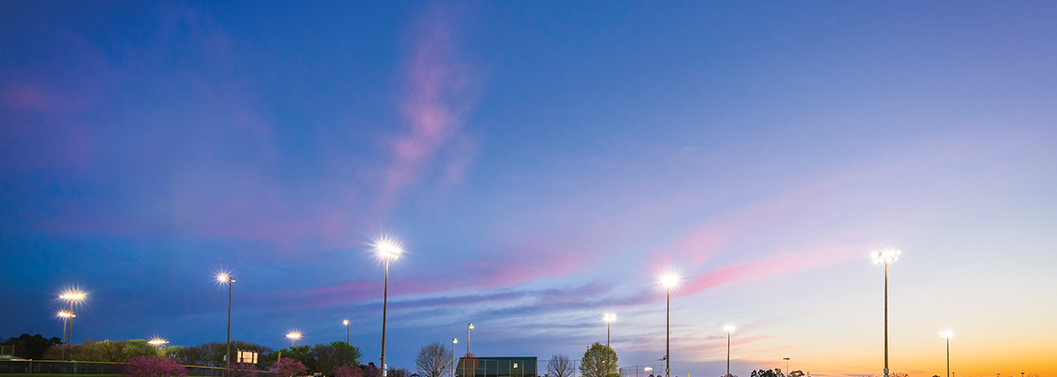PODCAST
NESFMA – Perennial Ryegrass on Athletic Fields
PODCAST: PLAY IN NEW WINDOW | DOWNLOAD
Podcast (podcast_associations): Play in new window | Download (Duration: 7:03 — 9.7MB) | Embed
Subscribe Email | TuneIn | RSS
NEW ENGLAND BLADE: Pam Serratt
Perennial ryegrass (Lolium perenne L.) is the predominant cool-season sports turf grass. It was originally introduced to the United States as an amenity grass, forage grass, and for soil erosion control, and we’ve been successfully using turf-types since their introduction in the 1960s. Although perennial ryegrass is revered in Europe, it is somewhat suffered in the United States, with some cool-season turf managers preferring to seed only Kentucky bluegrass (Poa pratensis), even if the chance of success is minimal. The distaste for perennial ryegrass as a sports turf grass has always perplexed me, since I know that most fields are already comprised of ryegrass, and I know just how great it can perform as a sports surface. It does have its challenges, but I believe its pros outweigh its cons. Let’s delve deeper in a point-counterpoint format:
Point: It is a bunch-type grass, and therefore does not have the capability to spread laterally.
Counterpoint: Ryegrass is a prolific producer of tillers and provides great sward density – particularly if mowed at the lower end of the preferred height of cut (1 – 2″). In studies conducted at Ohio State over many years, ryegrass has had recuperative potential as good as Kentucky bluegrass or tall fescue under traffic. In addition to its recuperative ability, it is very wear tolerant, and persists during heavy traffic.
Point: Because it is a bunch-type grass, fields must be constantly overseeded.
Counterpoint: There is no such thing as an athletic field that doesn’t need to be constantly overseeded, regardless of turf type. On native soils, where traffic and compaction are commonplace, all cool-season turfgrasses need regular overseeding to keep fields playable and safe.
Point: It is slippery.
Counterpoint: It is shiny on the underside of the leaf, which makes it look wet from a distance.
Point: It has poor heat, drought and cold tolerance.
Counterpoint: Like bluegrass and tall fescue, it is a cool-season grass, and so prefers air temperatures of 60 – 75° (15 – 24°C) and soil temps of 50 – 65°F (10 – 18°C). In extreme conditions, it may not be as heat and drought tolerant as tall fescue, or as cold tolerant as bluegrass, but it will survive in most areas.
Point: It is susceptible to grubs.
Counterpoint: Like many other turfgrasses, it is susceptible to grubs. However, many perennial ryegrass cultivars contain endophytes (microscopic fungi in the plant cells) that prevent attack from surface-feeding pests such as bluegrass billbugs, chinch bugs and sod webworms.
Point: It is difficult to mow in spring when flower stems are forming. This can result in poor mowing quality.
Counterpoint: Modern cultivars and sharp mower blades greatly reduce or eliminate this problem.
Point: In fall and spring, ryegrass does not mix well with other grasses. The color is different, and the clumps of ryegrass stand out.
Counterpoint: Ryegrass staying green longer into the fall/early winter and greening up quickly in spring is a major advantage for sports turf managers with fall or spring sports. Masking color differences can be achieved by applications of PGRs, iron or nitrogen fertilizers, choosing bluegrass cultivars with short winter dormancy, or spraying the field with a green dye in early spring. Some turf managers may also cover the field with a growth blanket, to promote uniform spring growth of all the grasses. In Europe, ryegrass cultivars are much lighter green, to mask the Poa annua that invariably encroaches on sports fields.
Point: Ryegrass takes over the field like a weed.
Counterpoint: The number-one reason it does so well is its ability to germinate and establish quickly. The ability to grow quickly means it can shade out the bluegrass and prevent seed germination and establishment. Athletic fields are not perennial stands of grass like lawns; they are in a constant state of renovation and, as such, the key to success is a quick establishing grass.
Point: Perennial ryegrass is susceptible to a whole host of turfgrass diseases.
Counterpoint: Yes, it is. No arguing on this point. If the conditions are favorable for a disease attack, ryegrass is prone to get it. Turf managers need to be extremely vigilant with summer applications of irrigation and nitrogen, and choose cultivars that have shown improved disease resistance. Where possible, especially on game fields, preventative applications of fungicide may be required. As a side note, however, because it is so quick to grow, it can sometimes survive a disease like damping off much more successfully than slower-growing species.
Pamela Sherratt is sports turf extension specialist at The Ohio State University. Connect with Pam at sherratt.1@osu.edu.
This article originally appeared in the June 2023 issue of SportsField Management magazine.

